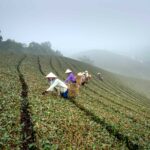Food Waste Action Week is a week-long event, typically held in the first week of March since 2021. This year, it will be held from March 2 to 8. Did you know, that if the food we waste were a country, it would have the third-largest carbon footprint after the U.S. and China? The good food we throw away impacts our environment and contributes to climate change. Not only do we waste food, but we also waste the valuable resources used to produce it — from the land, fertilizer, and water used to grow the food to the greenhouse gasses from production and transport.
History of Food Waste Action Week
In the late 1800s and early 1900s, industrialization and the manufacture of goods dramatically changed how Americans ate food. Food became commercialized and moved from farm to table to factory to table. Families began wasting food because it was cheaper and more accessible. Throwing away food on the street became a serious health problem. It wasn’t until the early 1920s that health officials recognized the need for proper sanitation and instituted waste disposal practices.
After World War II, chemical fertilizers entered the market when the government realized that excess ammonium nitrate, originally produced for explosives during the war, could be applied to crops as a nitrogen fertilizer. Machinery and the development of agricultural chemicals led to an overproduction of food. The U.S. produced so much food that in 1954, the government organized Food for Peace to export excess food to impoverished countries. In 1960, President Johnson declared the “War on Poverty” and attempted to feed low-income citizens.
World War II took the U.S. economy out of the Great Depression and into a new era of prosperity. Consumption and planned obsolescence were encouraged to sustain economic growth. Today, we lose or waste about a third of the food produced globally, and it’s sad not only for the poor who don’t have food but also for our environment. This is why Love Food Hate Waste started the first-ever Food Waste Action Week in 2021 to educate people on food waste and its impact on climate change.
Food Waste Action Week timeline
Food is traded from farm to table, and families waste food because it is cheaper and more accessible.
Since food preservation is purely voluntary, it is portrayed as patriotic.
The Great Depression leads to lower incomes and declining demand causing many crops to rot in heaps or fields.
The U.N. estimates that we waste about 931 million tons of food annually.
Food Waste Action Week FAQs
How can we raise awareness about food waste?
There are dozens of ways you can help save our planet. Here are some practical ways you can raise awareness about food waste: Reduce or stop food waste in your life. Spread the facts on social media and to your friends and family. Volunteer at or start your own community food waste initiative. Support businesses with good food waste practices.
What happens to food waste?
Food waste rots and emits methane and other G.H.G. These gasses contribute to climate change and cause health issues related to air pollution. Luckily, with proper waste management, you can play your part in disposing of your food waste in the right way.
What is the best solution for food waste?
There isn’t only one solution for food waste. However, we’ve rounded up a few food waste solutions you can implement at home: Shop smart and don’t over-shop. Try not to be a picky eater. Get creative with scraps and leftovers. Think broth or casseroles! Only throw food away if it will be unsafe to eat it.
How to Observe Food Waste Action Week
Track your food footprint
You can monitor how much food you and your family throw away at home each week. A great way to start is knowing the right serving sizes for you and only cooking what you can eat. If you struggle to cook exact portions, get creative with your leftovers.
Understand dates
Know the difference between “Use by” versus “Best before.” “Use by” is about safety – you should not eat food after this date (even if it looks or smells fine). “Best before” is about quality – although food won’t be at top quality after this date, it will still be safe to eat for some time after.
Plan your meals
Make a meal plan for the week and write a shopping list. Before you shop, plan out your portions, so you only buy what you need. Take note of what you have at home before shopping.
5 Important Facts About Food Waste
It impacts the environment
Food wastage contributes 8–10% of total manufactured greenhouse gas (G.H.G.) emissions, seriously impacting climate change.
Carbon footprint
If we all stopped wasting bread at home in the U.K. for a year, it could do the same for G.H.G. as planting 5,3 million trees.
How the world is responding
Many regions throughout the U.S. and the world are working toward zero food waste.
Initiative to reduce food waste
Teton County has a waste transfer station, where they collect waste and then transport it to Bonneville Landfill, over 100 miles away.
Putting food waste in perspective
Every day the equivalent of 20 million slices of bread is thrown away in U.K. homes, which could feed 10 million people.
Why Food Waste Action Week is Important
It reduces our carbon footprint
Food Waste Action Week is important to raise awareness of the impact of food waste on our planet. Throwing away good food is a waste of the resources, energy, and water used to produce and store this food. It leaves a huge carbon footprint.
It supports sustainable development goals
Food Waste Action Week aims to create lasting change that will help achieve the U.N.’s Sustainable Development Goal of halving the world's food waste by 2030. We only have one earth, and we need to look after it.
It saves you money
We waste 6,5 million tons of food a year in the U.K. alone. Besides the environmental impact, we must reduce this number to help every household save money by fully using each food item they purchase.
Food Waste Action Week dates
| Year | Date | Day |
|---|---|---|
| 2024 | March 4–10 | Monday–Sunday |
| 2025 | March 3–9 | Monday–Sunday |
| 2026 | March 2–8 | Monday–Sunday |




























